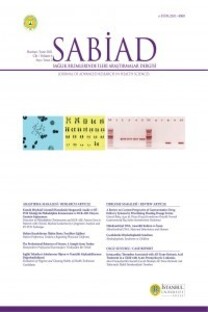PRECISION MEDICINE IN NEUROBLASTOMA: EXPERIENCE WITH NEXT GENERATION SEQUENCING
Objectives: The objective of this study is to examine neuroblastoma patients that were examined by next generation sequencing (NGS) for targeted therapy related specific gene mutations including Anaplastic Lymphoma Kinase (ALK) Materials and Methods: Molecular examinations of neuroblastoma according to Turkish Pediatric Oncology Group protocols (Nmyc amplification, 11q23 deletion, 1p36 deletion, DNA ploidy by Cell cycle kit in flow cytometer) is studied in our department in all cases collected from Turkey. Among these cases, the patients that recurred even after multi model therapies, are requested NGS to evaluate for targeted therapy decision. We study single nucleated variations after DNA isolation using Pillar Onco/Reveal Multicancer v4 with CNV Panel with 60 genes (ALK, BRAF, ERB2, PIK3CA, EGFR, KRAS, MET, ….) on İllumina Miniseq platform. Results: We especially reported ALK mutations which has indication for crizotinib or alectinib. Out of our investigated patients only 22% (9/41) had ALK mutations. Two patients (22%) had R1275Q mutation, six patients (66,7%) had F1174L mutation and one patient (11%) had L1226F, S1189F, V1135A and G1225S mutations. Conclusion: Our patient cohort seems to be showing ALK mutations and F1174L (sensitive to alectinib) mutation more often than R1275Q mutation (sensitive to crizotinib) in neuroblastoma cases. The reason that ALK mutation ratio is higher than literature. The reason of this might be because of selection of patients by the clinicians. These patients received targeted therapies and had longer survival.
PRECISION MEDICINE IN NEUROBLASTOMA: EXPERIENCE WITH NEXT GENERATION SEQUENCING
Objectives: The objective of this study is to examine neuroblastoma patients that were examined by next generation sequencing (NGS) for targeted therapy related specific gene mutations including Anaplastic Lymphoma Kinase (ALK) Materials and Methods: Molecular examinations of neuroblastoma according to Turkish Pediatric Oncology Group protocols (Nmyc amplification, 11q23 deletion, 1p36 deletion, DNA ploidy by Cell cycle kit in flow cytometer) is studied in our department in all cases collected from Turkey. Among these cases, the patients that recurred even after multi model therapies, are requested NGS to evaluate for targeted therapy decision. We study single nucleated variations after DNA isolation using Pillar Onco/Reveal Multicancer v4 with CNV Panel with 60 genes (ALK, BRAF, ERB2, PIK3CA, EGFR, KRAS, MET, ….) on İllumina Miniseq platform. Results: We especially reported ALK mutations which has indication for crizotinib or alectinib. Out of our investigated patients only 22% (9/41) had ALK mutations. Two patients (22%) had R1275Q mutation, six patients (66,7%) had F1174L mutation and one patient (11%) had L1226F, S1189F, V1135A and G1225S mutations. Conclusion: Our patient cohort seems to be showing ALK mutations and F1174L (sensitive to alectinib) mutation more often than R1275Q mutation (sensitive to crizotinib) in neuroblastoma cases. The reason that ALK mutation ratio is higher than literature. The reason of this might be because of selection of patients by the clinicians. These patients received targeted therapies and had longer survival.
___
- Wellek S, Blettner M. On the proper use of the crossover design in clinical trials: part 18 of a series on evaluation of scientific publications. Dtsch Arztebl Int. 2012;109(15):276-81
